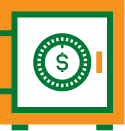
Because we take your financial protection very seriously, please remember that we would never ask you for your PIN or password by email, phone call, or text.

Cairo Amman Bank announced its main sponsorship of the “Zaytoun Biladi” Festival held at Icon Mall from 12 to 16 November, organized in cooperation with the Ministry of Tourism and Antiquities. The festival celebrates the olive harvest season and highlights the banking sector’s role in supporting Palestinian heritage and empowering small business owners.
Read More